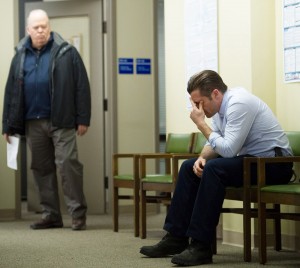Prisoners breaks free from thriller cliches
One ability that movies have, when they are done right, is to take an issue that appears cut and dry and mine unexpected things from it. It is difficult to look past the horror of child abduction. With the Ariel Castro case all over the news earlier this year, the shocking nature of what terrible things some people are capable of doing to others is still fresh in our minds. Denis Villeneuve’s film Prisoners takes child abduction and explores it more deeply. The film, through great direction and writing, and even better acting, manages to follow two major threads related to the kidnapping. The first is a thread relating to the psychological impact something like this causes, bringing to light a spectrum of primal emotions. Films like these can be termed psychological suspense and horror, as the thought process involved in the attempt to apprehend such criminals can become very dark.

Breaking down · Jake Gyllenhaal plays Detective Loki, the primary law enforcement officer investigating child abductions in Prisoners. – Courtesy of Warner Brothers Pictures
The story revolves around two characters. Hugh Jackman’s plays Keller Dover, the father whose daughter was abducted during Thanksgiving dinner. His struggle to do anything he can to get her back is one of the two pillars on which the movie stands, and it takes a very dark turn when he kidnaps the man who used to be a prime suspect and keeps him prisoner in an attempt to get answers out of him. His storyline drives the psychological questions the movie poses, both in the examination of his actions and the reactions of the people around him. The other character is Jake Gyllenhaal’s Detective Loki, the law enforcement officer in charge of the investigation. He plays the detective assigned to the case who has to simultaneously deal with the complicated case before him and the wild card that is Keller Dover. His story line drives the suspense aspect of the film as he attempts to unravel the web of what is going on around him.
As one begins to watch the film, it is Jackman’s character that stands out immediately. He plays a patriarch obsessed with disaster preparedness. Keller brims with an intensity that makes him never appear comfortable, even in the opening scenes where he is just having a Thanksgiving dinner with his family. That intensity explodes into anger as the situation with his daughter continues. So intense is that fire that, in the first act of the movie, it is hard to relate to him. His response to everything is short-tempered and violent. He seems insane when he plans to kidnap the wonderfully creepy Alex, played perfectly by Paul Dano. As the film goes on, however, and the horror of the situation becomes clearer, Jackman’s violent outbursts seem less like the flailings of a madman and instead acts of almost powerless desperation against an unseen enemy.
It is that invisible enemy that transforms the investigative thread from a mere thriller into a true horror film. There is an idea in horror filmmaking that the unseen monster is always scarier than the one we can see. The audience’s imagination can usually imagine something much more terrifying than whatever the filmmakers are able to put on the screen. In Prisoners, one cannot see the crime being committed. The audience sees the girls in one scene and they are gone in the next. The audience doesn’t know who took them, where they are, or what happened to them. One sees a little more than the characters do, but not much. The audience only knows they were taken by someone. So the audience searches for whatever explanation it can — whatever way it can find to explain what happened — to imagine what kind of monster could do that. The families in the film are in similar disbelief while Gyllenhaal’s character struggles to stay clear-minded in the face of an emotional maelstrom.
It is through the great cast that the film employs that the viewer can fully observe the spectrum of responses invoked by the horror going on on-screen. A murderer’s row of character actors fills out the rest of the cast. Terrence Howard, Maria Bello, Viola Davis, Melissa Leo and the aforementioned Dano all evoke a heartbreaking spectrum of emotions, not to mention bales of the subtlety that Jackman lacks in his performance.
Villeneuve manages to merge the two aspects of masterfully. Again, at first as the scenario is being set up, some of the notes seem a bit out of place. Jackman’s unease is a bit too obvious, the story a bit too formulaic. Villeneuve however begins his first American film with the same knack for intensity that has characterized his earlier offerings. Indeed the psychological cyclone that develops around Jackman’s character and the static electricity of suspense and horror that builds up around Gyllenhaal’s investigation finally collides, in large part through Roger Deakins’s masterful cinematography. That forms a perfect storm of intense, riveting and ultimately satisfying cinema.
Follow us on Twitter @dailytrojan
